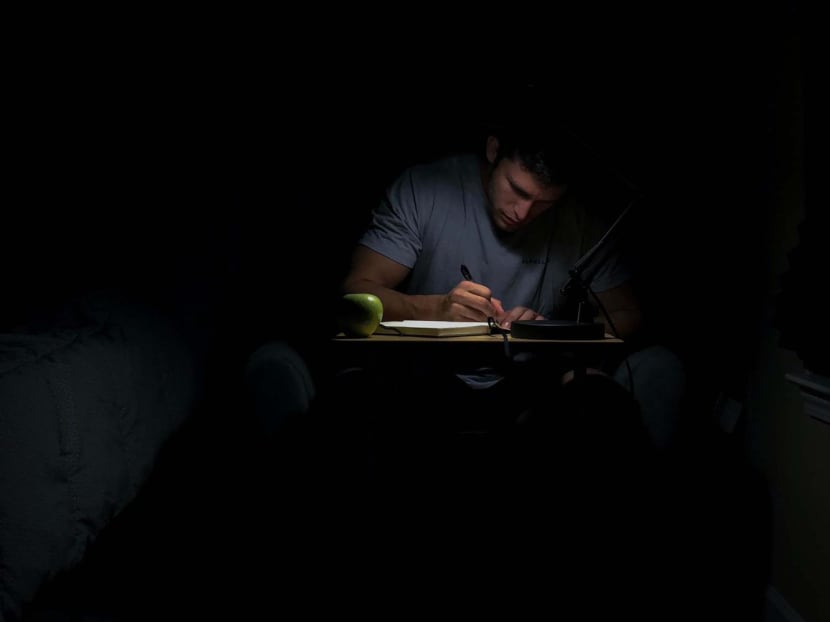Some ghostwriters see growing demand for services for school assignments, projects — and even exams
SINGAPORE — Christine (not her real name) runs a ghostwriting service in Singapore as a side-gig under the name Emerald City Creative on e-marketplace Carousell. “Our services are very popular among students here,” she told TODAY, requesting that her identity not be revealed.

- Dozens of listings on e-marketplace Carousell offer ghostwriting services for school assignments and even dissertations
- Some are even offering to take online timed exams on students’ behalf
- Two providers of ghostwriting services said that demand has been booming since the start of the Covid-19 pandemic
- One said she fulfils about 150 requests a month from students in universities and polytechnics here, as well as Singaporean undergraduates overseas
SINGAPORE — Some years back while at university in the United Kingdom, Christine (not her real name) was racking her brain figuring out how she could pay off her student loans without a scholarship.
Together with a former schoolmate from Hwa Chong Institution, she decided to do what she did best: School assignments, but this time on behalf of others for a fee.
Since graduating and paying off her student loans, Christine continues to run her ghostwriting service in Singapore as a side-gig under the name Emerald City Creative on e-marketplace Carousell.
“Our services are very popular among students here,” she told TODAY, requesting that her identity not be revealed.
Ever since news broke last month that 11 law graduates had been caught cheating in their Bar examinations, the academic integrity among students here has come under scrutiny, with a High Court judge questioning whether a “culture of cheating” existed among law students.
Several university students from other faculties had earlier admitted to cheating at exams in interviews with TODAY, claiming that not cheating would put them at a disadvantage compared to their schoolmates who were doing it.
On Carousell, a quick search shows dozens of listings purporting to offer ghostwriting services that run the gamut from assignments and essays to final-year projects and dissertations.
As Covid-19 forced many exams to be taken online, ghostwriters have also been offering to complete online timed exams for students. They need only book a time slot and the ghostwriters will be able to complete it within the time limit.
Promising to be free of plagiarism, with complete confidentiality and quality, many of these postings even openly advertise the names of the schools for which they provide their services.
Christine, now in her late-20s and holding a day job, said that demand for ghostwriting services has been booming ever since Covid-19 struck.
Demand for her services grew by about 50 per cent in early 2020 and has been quite sustained over the two years since, she added.
With a team of about 10 to 15 other freelance writers, Christine said that her ghostwriting service now handles about 150 requests a month.
One of her listings on Carousell states that services are available even for online exams that have extra safeguards against cheating such as requiring students to turn on their web cameras or use special examination software that locks their computer from being able to access the internet.
“So long as they can send us the questions, we can do it,” she told TODAY. “But they have to figure out how to deal with the logistics.”
Christine said that she has quite often taken requests from students from the universities and polytechnics in Singapore.

Many of the requests, however, tend to be those from private universities as well as Singapore students studying in the United Kingdom and Australia, she added.
While her rates vary widely depending on the deadline and whether she has writers available, she charges roughly S$100 to S$120 for every 1,000 words for an essay.
Beyond holding online exams, some tertiary courses have also shifted towards grading students based on take-home assignments to replace in-person exams.
Christine said that this could be why more students are turning to ghostwriting services like hers.
“But more importantly, the pandemic has made it very tough for many to learn effectively or seek help. So some have no choice in such a stressful situation,” she said.
Another provider of these services, Mr Joshua Lim, said that he receives queries from about 200 students every month needing help with their assignments or projects, of which half of them get fulfilled by his company Coding Hero.
His company focuses mainly on computer programming and charges on average about S$150-200 for a typical assignment and can go up to more than S$1,000 for a final-year project.
Mr Lim, a 28-year-old computer science graduate who works full-time as a mobile application developer, said that he has a network of about 150 coding experts that he sources from part-time job portals and word of mouth whom he can tap to take on job requests.
Demand for his services has also been growing since he started in early 2020.
He said that the requests he gets come from a good mix of Singaporeans from overseas universities and undergraduates — including foreign students — from local universities.
“Most of them, actually, just don’t want to be in the course that they have chosen and want to get their education over and done with,” Mr Lim said, adding that he has also gotten requests from working adults who were instructed by their employers to take part-time courses.
Still, Mr Lim maintains that he is not providing a service to promote cheating.
After all, his company is a registered business and its terms and conditions state that all its products are provided “solely as an example of research, reference for learning purposes, or as a sample on how to perform coding and research related tasks”, he said.
Asked if he truly believed students were not using his work to cheat in their schoolwork, Mr Lim pointed to his company’s terms and conditions but conceded that he would not be able to check if they were copying his work in its entirety.
He said: “Let’s say you have a tuition teacher. He would do the same thing — he would do the work for you and possibly explain the steps involved but would tell you not to submit that work because that would be cheating.”
For Christine, when asked how she felt running a service that helps students cheat, she said that many people tend to simply dismiss her clients as people who want to cheat and score better.
However, many of her clients are working adults and part-time students too caught up with work to complete their assignments on their own. Some had family members who were hospitalised.
"Clearly it's not ideal that they have to seek outside help for their (school) work," she said.
"But what we should really consider more is why do they need to seek external help and how we can change that systemically to have a better education system."
She added: "What we are is a last line of support for these students."
As for why she continues to run her business, the reason has remained largely the same as why she started it in the first place.
“We just want to help and give a way for more people trapped by student debt to quickly clear their loans as well,” she added, referring to those working for her.
TODAY has reached out to Carousell to ask about its policies on these services being offered on its platform.
STUDENTS WHO CHEAT MAY FACE EXPULSION
In response to TODAY's queries, the Nanyang Technological University said that cases of students engaging ghostwriting services for their schoolwork are rare.
"Cheating in assignments or projects are usually discovered through professors’ vigilance and familiarity with each student’s subject knowledge and writing style, whistle-blowing reports, or through similarities detected in students’ submissions," NTU said.
It added that NTU students have to run their essays through Turnitin, a plagiarism detection software, before submission.
Depending on the severity of the case, students caught cheating may face a warning, reduced marks, a failing grade for the assignment or the entire course, as well as expulsion.
Meanwhile, the Singapore University of Technology and Design (SUTD) said it has never encountered any students who have used ghostwriting services.
It added that the university also uses Turnitin, and that faculty members who detect students with similarities in their answering styles will call these students up for questioning.
SUTD students caught cheating may receive a fail for their subjects or be expelled.
The Singapore Management University (SMU) said that students found to have passed off someone else's work as their own may be punished with a failing grade for the exam, suspension or expulsion, depending on the circumstances.
SMU said that its courses use multiple forms of assessments to grade students, which reduce the weight of each assessment and lower the incentive to engage a ghostwriter.
These include in-person exams, class participation scores, group assignments, in-class quizzes, class presentations and plagiarism detection software.
The Singapore University of Social Sciences said that the university has a "backend system" that flags such offences and students who are caught may face expulsion.
The Singapore Institute of Management and the Singapore Institute of Technology declined comment. TODAY has reached out to the National University of Singapore and Kaplan Singapore to ask how prevalent such cases are among their students.











